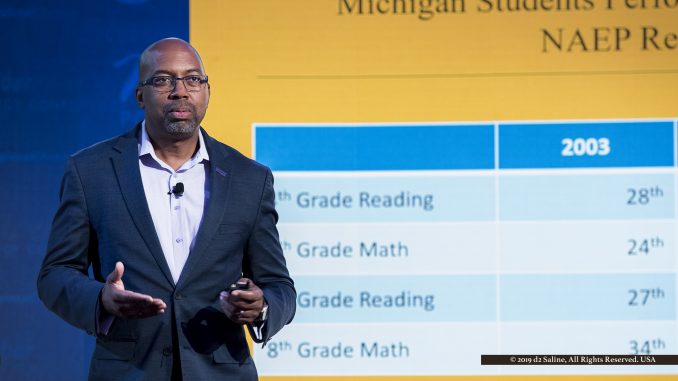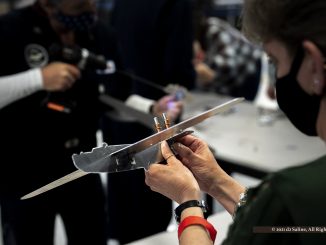
The topic of “education” did not come up generally or gently on the first full day of programming at the Mackinac Policy Conference. In fact, it started with a 9:00am session, held before a capacity-plus audience in one of the Grand Hotel pavilion rooms, introduced by a self-described “angry” City of Detroit Arts and Culture Director Rochelle Riley. [1-3]
Modering a panel titled “An Equitable Start: Aligning Early Childhood and K-12 Systems to Maximize Impact,” she started by dispelling any preconceived notion that this issue was in any way a marginal or square-peg-in-round hole topic for a politics and business gathering. [4,5]
This is the foundation of the workforce pipeline. And Dr Nikolai Vitti, Superintendent of Detroit Public Schools Community District asserted that this begins with shortcomings in what Michigan is doing in its approach to kindergarten. [6,7]
Yes: Kindergarten. He went on to endorse a move to mandatory full-day kindergarten, although “not without sufficient notice for families to prepare. We’re not out to create another hurdle and then penalize non-compliance. [8]
Reinforcing this in a very different session called “Filling the Skills Gap: An Open Dialogue on Workforce Realignment,” Dr Michelle Mueller, Washtenaw Community College Vice President of Economic, Community and College Development, expanded on the point. “We’re no longer talking about ‘K-12 education.’ This economy requires a society that thinks ‘K-through-forever skills development.
At the earliest point in primary education, we need to change the dialogue from discussing who is ‘college bound’ versus who isn’t — then helping plan for college for those who are. We need to be doing career planning, for all students, and set that up as a lifelong process.
After lunch today, things moved from foundational building blocks to center stage in the Grand Hotel theatre through a series of presentations introduced by Detroit Regional Chamber President and CEO Sandy Baruah: “Prepare Michigan: Solving the Educational Crisis.” Just before addressing that group, he summarized the 2019 Mackinac Policy Conference approach to education reform.
The importance of ‘Launch Michigan’ really can’t be overstated. Because … this is the first time we’re doing it in this way.
But also, I just want to caution folks, … this is not going to be fast. We did not get into the education fix that we’re in overnight, and the solution is not going to be overnight. This is not going to a six month, issue a report, hope for the best thing. This has got to be long term, … blocking and tackling, with a group of very disparate leaders, to get to a common solution.
Is everybody going to be happy at the end of this process? Absolutely not. But are we going to be on a better trajectory afterwords? Absolutely.
In the first “Prepare Michigan” segment, “Framing the Issue,” Dr Bill Pink, President of Grand Rapids Community College, put numbers to the challenge as a way of providing both direction and measures of progress toward goals set. [14,15]
- Michigan has an “oversupply” of individuals who hold only high school diplomas or less
- By 2020, Michigan is projected to have a significant “undersupply” of individuals who have “some college,” an associates degree or bachelor’s degree
- “Fewer Michigan high schoolers are taking career and technical education credits and the vast majority do not complete a program” — citing Michigan Department of Education numbers from a high of 138,631 in the 2010-11 academic year, to 127,786 in 2016-17
He then emphasized that this is not limited to inner city students or those in poorer populations. Following are 2017 Michigan NAEP relative performances as ranked against other states, by student type. [16]
| Proficiency | All Students | White | Higher Income |
| 4th Grade Reading | 35th | 45th | 44th |
| 4th Grade Math | 35th | 45th | 35th |
| 8th Grade Reading | 29th | 37th | 31st |
| 8th Grade Math | 33rd | 40th | 37st |
This is the substance behind the anger that Rochelle Riley shared in her opening comments on May 29 — sentiments which the audience wholeheartedly agreed. They are also the substance behind initiatives undertaken at the local level, such as those by Dr Vitti in Detroit and financial backing for broader work through The Kresge and WK Kellogg Foundations. If nothing else, participants should leave Mackinac Island tomorrow with a much clearer understanding of the problem, its trajectory, and how it will inevitably affect their bottom lines. [17,18]
Strong motivation for change.
References
- “2019 Mackinac Policy Conference” Detroit Regional Chamber.
- Grand Hotel (home page).
- “About” Rochelle Riley.
- “Education and work force development anticipated to top agenda for 2019 Mackinac Policy Conference later this month” Dell Deaton (May 17, 2019) Saline Journal.
- “As 2020 Michigan budget process draws to close, Representative Rebekah Warren explained her priorities to constituents” Dell Deaton (May 22, 2019) Saline Journal.
- “About Dr Vitti” Detroit Public Schools Community District.
- “Vitti: Some teachers, principals should get performance-based pay for improving achievement” Lori Higgins (April 10, 2019) Chalkbeat.
- “Devin Scillian talks to Dr Nikolai Vitti, Superintendent of Detroit Public Schools Di…” Click On Detroit | Local 4 | WDIV (May 29, 2019) YouTube.
- Dr Michelle (Ebner) Mueller (LinkedIn Profile).
- Detroit Regional Chamber (home page).
- “Sandy Baruah” Detroit Regional Chamber.
- “Sandy Baruah and Doug Rothwell | Mackinac Policy Conference 2019” Detroit Public TV (May 30, 2019) YouTube.
- Launch Michigan (home page).
- “Bill Pink PhD” Grand Rapids Community College.
- “Michigan Department of Education” Michigan.
- NAEP: National Assessment of Educational Progress (home page).
- The Kresge Foundation (home page).
- WK Kellogg Foundation (home page).



